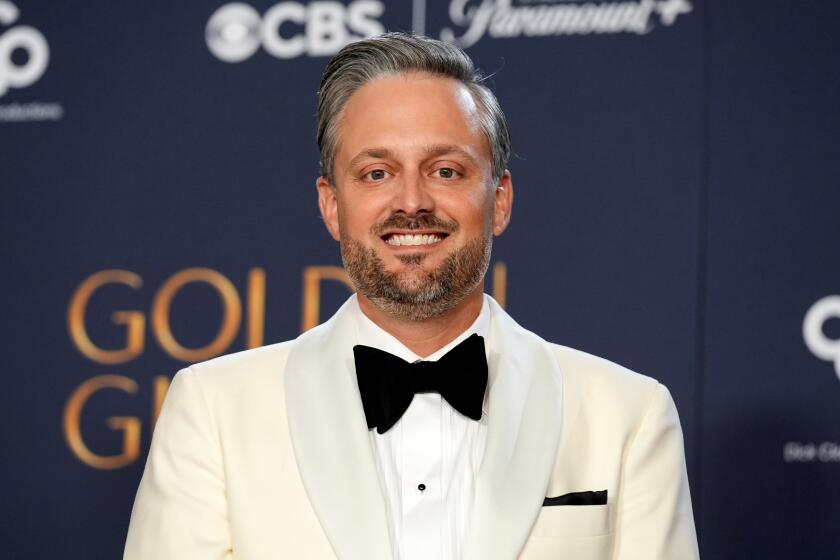Jessica Chastain gets her character in ‘Zero Dark Thirty’
- Share via
As the overstressed beating heart of “Zero Dark Thirty,” a CIA analyst named Maya who relentlessly chases after the hated phantom that was Osama bin Laden, Jessica Chastain is at times steely, at times shattered, potty-mouthed but somehow girlish, touchingly lonely but scrutinized by the entire spy agency’s hierarchy.
To get to her character’s essence, Chastain used her preferred technique, which is more methodical than Method. “Every project I start I make lists, and the first one is what everyone [in the film] says about the character, and what they say about Maya is she’s a killer.”
In an extended sense, that’s certainly the literal truth about the woman the screenplay calls Maya, the book by SEAL team member Mark Owen (realsurname Bissonette) calls Jen and the CIA brass apparently call overemphasized. (The Washington Post recently described how thereal-life operative was denied a rise in rank and pay, speculatively for drawing too much attention to herself. And yet the agency has not denied the script’s contention that the female analyst, bucking a certain degree of internal doubting and inertia, was the push rod of the effort to find and, yes, kill Bin Laden.) For screenwriter Mark Boal’s part, he told The Times, “I’m thrilled with how Jessica captured the dedication and sacrifice of CIA officers. In reality, as in the film, some of them do have big personalities.”
PHOTOS: Celebrity portraits by The Times
It says much about her character’s central role in the story that despite all the film’s awards buzz — and media wrangling about its gripping torture sequences— the most talked-about moment in the movie comes from a comic beat of sorts. It happens when Maya, who’s been placed in the corner during a tense meeting to pitch a raid on Bin Laden’s compound to the CIA director (James Gandolfini as, unmistakably, Leon E. Panetta) pipes up unexpectedly with an obscure if useful fact about the terrorist’s hideaway. When the boss queries, “Who are you?” she replies with an expletive, “I’m the ... who found this place — sir.”
Though Chastain has never met the woman she portrayed, she knows where the language came from. “Maya was a girl that people said looked like a girl. She didn’t look like a woman, you know? And then I thought, ‘Ooh, that’s something really interesting to latch on to,’ that when at first you don’t understand what she’s capable of, you dismiss her immediately. Her voice even, there’s something girlish. Then, also, I’m told that there’s a truck driver mouth. Perhaps because people dismiss her when they first see her, she needed people to listen. So you shock them.”
Raised in humble circumstances in the north Bay Area with two brothers and two sisters, Chastain sometimes marvels how “a Northern California hippie vegan girl [ends up] playing a Mossad agent in “The Debt” and now a CIA targeter.”
IN CASE YOU MISSED IT: Golden Globe nominations
Chastain finds a turning point for her character in Maya’s friendship with her colleague Jessica (Jennifer Ehle), an almost equally dedicated CIA “targeter.” Until the women work together, Maya had been something of a loner. Says Chastain: “She didn’t have a boyfriend. Didn’t have any of that. It was a calling that she had.... Everything was about Maya trying to get what she wants by using her brain and not her sex.” Until Jessica sets up a meeting with a terrorist at remote Camp Chapman, with dire results. .
“I think it gets very personal after Camp Chapman; I think we see a switch in her character there. [After the incident], the next time we see her she’s just hollowed out, there’s no makeup, she dresses almost like a man. That’s when it becomes very personal. Before that, 3,000 people died [on Sept. 11, 2001], and yes, it’s herjobto protect this country. So of course she’s going to do what she can.” But after Chapman, in a scene with a fellow combat-honed operative, Maya says, “A lot of my friends have died trying to do this. I believe I was chosen to finish thejob.” “That is true Maya,” Chastain says. “There’s an earnestness about her where sometimes she says something and you go, ‘Wow, that’s so honest.’ It’s this pure belief, and no one’s going to stop her.”
Chastain remains grateful that screenwriter Boal’s research — however controversial the interrogations’ role is — has largely held up as updates such as Owen’s book emerge. The tears Maya sheds in the film are the very tears thereal-life “Jen” sheds in the book. The targeter’s “100%” certainty that she had found Bin Laden was justified, and she identified the body for the very skeptics who once stood in her way.
IN CASE YOU MISSED IT: Golden Globe nominations
But after Bin Laden’s death, as Maya boards a cavernous transport plane all alone, “It’s very complicated. Where do you go? What do you do?” Chastain says. “This ends the greatest manhunt in history. She was someone who was so focused that she gave up her self. Then at the end of the movie when they say, ‘Where do you want to go?’ Where can she go? She has no idea.”
That’s not such a poignant question for Chastain herself. She’s currently enjoying a run on Broadway as the wounded title character in the venerable classic “The Heiress” and completing her own artsy indie film production, “The Disappearance of Eleanor Rigby.”
MORE COVERAGE
PHOTOS: Memorable red carpet moments
VIDEO: Go behind the scenes with the awards contenders
More to Read
From the Oscars to the Emmys.
Get the Envelope newsletter for exclusive awards season coverage, behind-the-scenes stories from the Envelope podcast and columnist Glenn Whipp’s must-read analysis.
You may occasionally receive promotional content from the Los Angeles Times.






